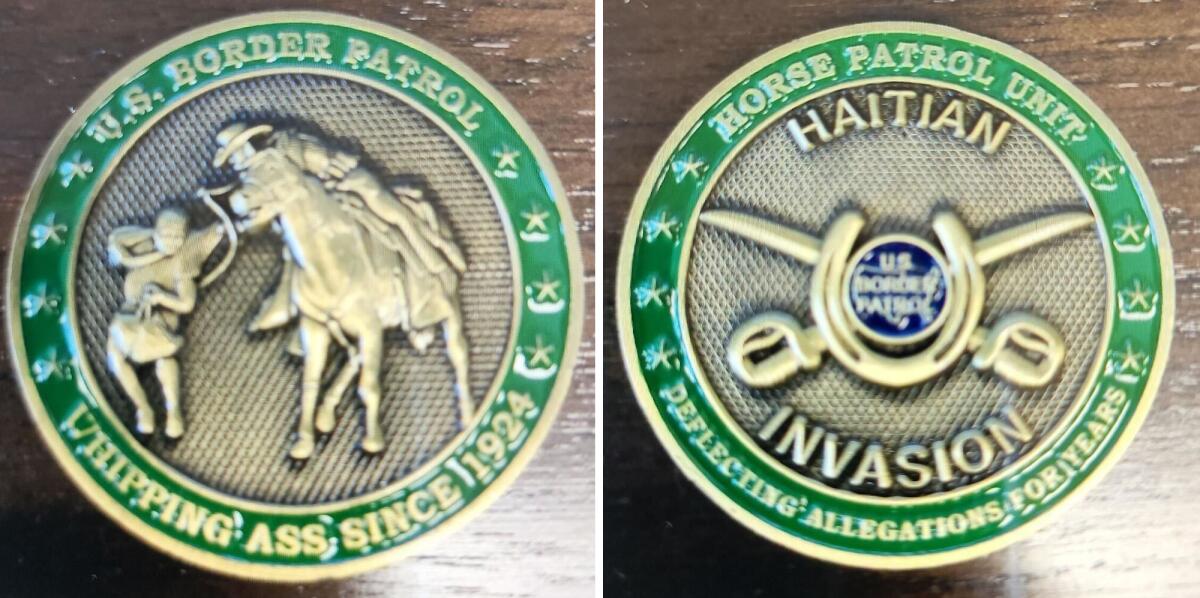Coins depicting Border Patrol agent grabbing Haitian migrant trigger investigation

- Share via
The photograph encapsulates the intensity of the clashes between Border Patrol agents and Haitian immigrants desperate to get into the United States.
An agent on horseback leans over, grabbing a man by the shirt as a rein dangles.
Now an image mirroring the Sept. 19 photo by Paul Ratje of Agence France-Presse has appeared on a “challenge coin” typically collected by agents, law enforcement officials and aficionados.
“Whipping ass since 1924” is written along the coin’s border.
The Times obtained photos of the coin. Its other side says “Haitian Invasion” with crossed swords and the words “U.S. Border Patrol,” “Horse Patrol Unit” and “deflecting allegations for years.”
U.S. Customs and Border Protection, which includes the Border Patrol, is investigating whether the coin and a similar one, which have been advertised online, were sold by anyone from the agency. It is unclear who produced the coins or how widely they have been distributed.
If the coins are connected to Border Patrol agents, they could become the latest example of what immigrant advocates have said is a prevalence of offensive humor within the ranks, after Facebook posts making fun of dead migrants and lawmakers surfaced in 2019.
Some critics have raised the question of racism against Black immigrants. And the head of Customs and Border Protection has denounced the coins.

“These coins anger me because the hateful images on them have no place in a professional law enforcement agency,” CBP Commissioner Chris Magnus said in a statement. “Those who make or share these deeply offensive coins detract and distract from the extraordinarily difficult and often life-saving work Border Patrol agents do every day across the country.”
Immigrant advocates were similarly outraged at the coin and the seeming lack of empathy for Haitian migrants it indicates.
The exemption will be applied on a case by case basis after security vetting and is expected to help Afghans who fled their country after U.S. troops withdrew and the Taliban took over last August, as well as some Afghans who entered the U.S. earlier.
“I think this is a testament of how embedded anti-Black racism is in the very fabric of the system of our country,” said Guerline Jozef, head of the Haitian Bridge Alliance in San Diego. “For people who might be associated with CBP to feel emboldened enough to engrave the likeness of a human being abused or mistreated as a symbol of what the department stands for.... We see these coins as an endorsement of what happened, and those responsible must be held accountable.”
“Challenge coins” have long been a part of law enforcement culture, including at the Department of Homeland Security, which includes CBP. They are generally innocuous, honoring employees or special events, former officials said, and are sometimes exchanged with members of other agencies.
One former senior Homeland Security official, John Sandweg, said he got a coin with a buffalo on it after visiting an agency office in upstate New York and another with a picture of a border tunnel commemorating a drug task force.
But the coins depicting the Haitian immigrants crossed a line, he and another former lead Homeland Security official said.
The other coin under investigation contained the same image of the migrant and the agent on horseback, with the words “honor will always be first.”
“It’s just outrageously inappropriate,” said Sandweg, a former lead Homeland Security attorney and acting head of Immigration and Customs Enforcement under President Obama. “This kind of thing sullies the reputation of the department where a few bad apples are doing stuff that really shocks the conscience and is so far beyond what is appropriate and acceptable. It hurts the entire department’s reputation.”
“This is a shame that this was done,” said Gil Kerlikowske, who was head of U.S. Customs and Border Protection under Obama. “This kind of grotesque humor permeates ... a lot of professions, including in law enforcement groups.“
Kerlikowske and Sand-weg said that “challenge coins” are a big part of Homeland Security culture and are generally meant for camaraderie and celebration. Sandweg said that when he visited local agency offices, he was sometimes gifted a coin celebrating that location, including the one from Buffalo. Other coins were handed out to remember special occasions or to honor staffers.
Head offices, like those of the Homeland Security secretary or ICE director, also made their own coins to hand out to employees.
Sandweg said that the design of coins is often decided upon at a local office, then sent to coin makers. Government funds can be used if the coin is for an honorary award, he said.
“Almost no oversight is exercised on the design of the coins,” he added. “No doubt the use of any official seal in conjunction with this message violated DHS policy, but there was never much guidance or oversight out there on what the coins can say. Of course, nobody was ever so dumb and misguided as to create a coin like this.”
The “Haitian Invasion” coin was brought to CBP officials’ attention in recent weeks, said a source with knowledge of the situation.
In addition to the internal investigation, cease-and-desist letters will be sent to vendors who produce unauthorized challenge coins using a CBP trademarked brand.
CBP is also investigating the actions of the Border Patrol agents who targeted Haitian migrants, as in the incident depicted on the coins. Homeland Security Secretary Alejandro N. Mayorkas has promised to release the results of that investigation.
The Biden administration’s decision to begin the mass deportation of Haitians in September caused alarm among immigrant advocates and prominent Democratic politicians. Thousands of Haitians were expelled and continue to be removed from the country.
It typified, to many, the White House’s turn toward restrictive policies in a political crisis, this time prompted by media coverage of Haitians camping beneath a bridge in Texas.
Since September, the administration has relied on the Title 42 policy, which cites the pandemic, as a justification to remove Haitians and other asylum seekers arriving at the border.
Border Patrol agents have long faced allegations of excessive force. The Supreme Court issued a ruling this week that will shield agents from being sued over such allegations.
More to Read
Sign up for Essential California
The most important California stories and recommendations in your inbox every morning.
You may occasionally receive promotional content from the Los Angeles Times.












